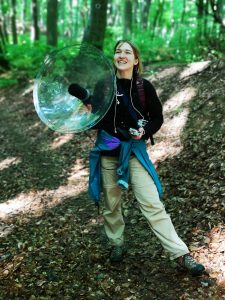PhD candidate, assistant research fellow
Biography
 – 2025-present: assistant research fellow, Department of Evolutionary Zoology and Human Biology, University of Debrecen, H-4032 Debrecen, Hungary
– 2025-present: assistant research fellow, Department of Evolutionary Zoology and Human Biology, University of Debrecen, H-4032 Debrecen, Hungary
– 2024-2025: assistant research fellow, Faculty of Science, University of South Bohemia, Ceske Budejovice, Czech Republic
– 2022-present: assistant research fellow, HUN-REN-PE Evolutionary Ecology Research Group, University of Pannonia, Veszprém, Hungary
– 2020-present: PhD at Doctoral School of Biology, Programme of ecology and evolution, Eötvös Loránd University
– 2017-2019: MSc in biology, Eötvös Loránd University, specialization in Ecology, Evolution and Conservation Biology
– 2014-2017: BSc in biology, University of ‘Babeș-Bolyai’, Romania
Contact
Room N-14, Building N, University of Pannonia,
Wartha Vince street 1, Veszprém, Hungary
Pf. 158, H-8201, Veszprém, Hungary
barta.karola.anna@mk.uni-pannon.hu
Research
I did my MSc thesis and PhD on the cultural evolution of bird song particularly focusing on the collared flycatcher as a model species. Many songbird species acquire their songs via social learning leading to a process called cultural transmission. I have been investigating under what circumstances can a cultural system form that is as diverse and the same time stable as seen in a collared flycatcher population from the hungarian Pilis mountains. I did so using computer simulations and an extensive dataset acquired via recording songs in the studied population.
I have always been keen on evolutionary processes and animal behaviour. That is why my current job at the HUN-REN-PE Evolutionary Ecology Research Group is something, I am happily diving into. My focus here is to understand the relationship between adult sex ratios and different genetic, demographic and life-history traits in tetrapods.
Publications
Krenhardt, K., Barta, K. A., Jablonszky, M., Laczi, M., Nagy, G., Zsebők, S. & Garamszegi, L. Z. (2025). Birdsong as an indicator of habitat structure and quality. Ecology and Evolution. https://doi.org/10.1002/ece3.71510
Jablonszky, M., Barta, K., Krenhardt, K., Nagy, G., Zsebők, S. and Garamszegi, L.Z., 2025. Experimental evidence of slight alteration of male Collared Flycatcher songs based on the female audience. Ibis. https://doi.org/10.1111/ibi.13410
Zsebők, S., Vaskuti, É., Laczi, M., Nagy, G., Jablonszky, M., Barta, K.A., Canal, D., Derégnaucourt, S. and Garamszegi, L.Z., 2025. Context-dependent organization of birdsong: experimental evidence from the collared flycatcher, Ficedula albicollis. Animal Behaviour, 219, p.123026.
Barta, K.A., Garamszegi, L.Z., Scheuring, I. and Zsebők, S., 2023. Effects of positive frequency-dependent learning, learning mistakes, and immigration on complex cultures–Validation on the song of collared flycatcher (Ficedula albicollis) by individual-based modeling. Frontiers in Ecology and Evolution, 11, p.1040550.
Barta, K.A., Hais, M. and Heurich, M., 2022. Characterizing forest disturbance and recovery with thermal trajectories derived from Landsat time series data. Remote Sensing of Environment, 282, p.113274.
Tammaru, K., Košnar, J., Abbas, A.F., Barta, K.A., de Bello, F., Harrison, S., Degli, E.I., Kiss, R., Lukács, K., Neumann, S.M. and Wagia, H., 2021. Ecological differentiation of Carex species coexisting in a wet meadow: Comparison of pot and field experiments. Acta Oecologica, 110, p.103692.

